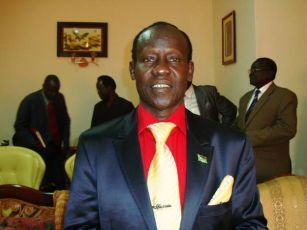South Sudan’s speaker of parliament calls for implementation of federal system
June 25, 2011 (JUBA) – The top lawmaker in South Sudan’s parliament has called for a debate on implementing a federal system in the transitional constitution the soon-to-be independent state will adopt after it secedes from the North.

Igga who publicly expressed his views on the nature of the transitional constitution for the first time since the debate began about the document two months ago further argued that when applied together with the “rule of law”, the federal system would practically “properly decentralise” the system in the new country.
Currently, the Government of Southern Sudan (GoSS) has been using a limited degree of decentralisation concentrating mainly on political decentralisation rather the giving states the responsibility for fiscal policy accountability and good governance, among others.
He disclosed that members of parliament, who are also over 90 percent members of the ruling Sudan People’s Liberation Movement (SPLM), support the idea of establishing a federal system in South Sudan.
Members of the SPLM Caucus have submitted their comments in writing proposing several amendments in the document. Some are however happy with the document and want to endorse it in its present form.
Last week the President of the Government of Southern Sudan, Salva Kiir Mayardit, who is supportive of the document in its present form without amendments, also criticised his deputy, Riek Machar, saying he was floating a different constitution in support of amendments.
While addressing the Speakers Forum for all the ten states, Kiir said the different “constitution” presented by the Vice President to the parliament would not be considered and showed “parallelism” in the government.
However, the Vice President Riek Machar has denied having any different version of the transitional constitution. Machar, who is also an elected MP in the
parliament, clarified that his were just personal comments expressing his proposed amendments on the document in writing and not a different constitution as such.
He also explained that there was no parallelism in the government, but one government with elected president, Salva Kiir, and his “running mate” who is his deputy, Riek Machar.
According to an anonymous senior official in the parliament, Machar’s comments also included his support for implementation of a federal system, among thirty different points on which he raised his concerns. The draft constitution however shied away from ‘federalism’ and preferred to call it “decentralization”, but provided for future study of the federal system before it could be implemented in the country.
Machar also proposed removal of president’s powers to fire elected officials including governors and MPs, the source added. He said he expressed the need for establishing the new nation on a solid foundation based on the democratic principles the region had fought for in order to install good governance and avoid confusions or any future political instability.
The source also added that the Vice President wanted Arabic to remain one of the official languages of South Sudan together with English at least during the four years of transition. Machar is reported to have cited the huge number of people who only went to school in Arabic or communicate using the language in their work places and would be affected by the abrupt change.
The parliament’s speaker on Thursday, who only made his views known publicly on federalism and not on other controversial issues in the document, strongly argued that the region should implement the federal system if it wants to successfully unite its people.
However, people opposed to federalism also argue that the federal system would create imbalances between the poor and rich states and instead promote regionalism, if not tribalism.
Besides the amendments proposed by the Vice President and the SPLM Caucus in the parliament, other proposed amendments from civil society organisations and women groups were floated about the controversial document.
South Sudan is left with only 14 days to formally declare its independence following the overwhelming vote in favour of secession from the rest of Sudan during a self-determination’s referendum in January this year.
The new transitional constitution is supposed to be passed before July 9 and signed into law on the formal independence declaration the day by the president to govern the region for the next proposed four years of transition.
The legislative organ is currently locked in debate over the transitional constitution in which several amendments were proposed by members of the assembly including provision of federalism as the would-be system of governance for the new state, among many others.
(ST)
